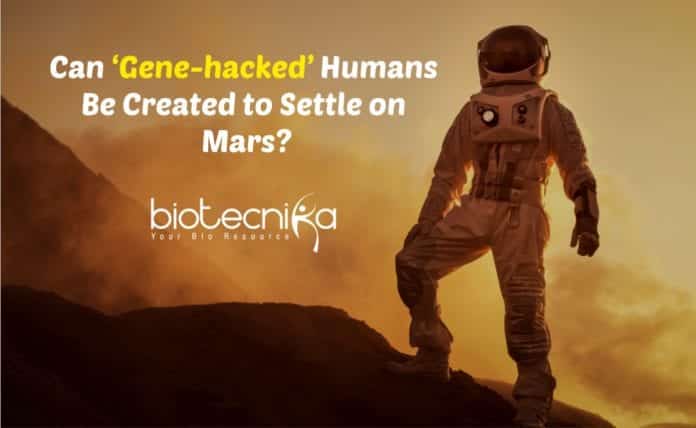‘Gene-hacked’ Humans on Mars – Humans Modified to Settle on Mars?
Man on Mars
Scientists urge that humans with resistance to pain and super strength, ‘Gene-hacked’ humans should be created to settle on Mars.
According to scientists, the future astronauts, before making the treacherous journey to Mars, should have their DNA altered because spacefarers will likely need to become super-humans to survive the trip, such as having extra-strong bones and radiation-resistant cells.
To get the first man on the Red Planet within the next two decades, a number of space agencies and even private companies have promised to make it possible.
SpaceX, billionaire Elon Musk’s rocket firm wants to fire a million people to Mars by 2050, while Nasa hopes to land astronauts on Mars in the 2030s.
In order to live on Mars, settlers would need to be “gene-hacked”, argued one prominent scientist in a webinar last week.
During an online chat held by the New York Academy of Sciences on May 12, an astrobiologist at the Lunar and Planetary Institute in Houston, Kennda Lynch said, “If people want to live, establish their family, work and thrive, and stay on Mars, DNA editing may need to come
into play.”The deadly environmental extremes and the barrage of cosmic radiation at the planet’s surface can be endured by edits to astronauts’ DNA.
A process in which scientists permanently change the climate of a planet – “terraforming”, would be the only other way to survive these extremes.
Gene editing
- Modifying, inserting, deleting, or replacing the DNA of a living organism is involved in gene editing.
- Against natural illnesses and diseases, gene editing could help in protecting humans.
- It is also believed by some that superhuman enhancements can be obtained by gene editings such as improved night vision or a boosted sense of smell
- There could be unknown consequences for babies due to editing DNA as it is a new and risky science. The prospect of “designer babies” could become reality with DNA-editing leading to societal changes
- In mice embryos, gene editing has been performed successfully.
- In November 2018, the embryos of two human baby girls were successfully gene-edited by a Chinese scientist.
Nasa’s GM astronaut
Scientists have pondered over for years on the controversial plot of gene-editing astronauts before shipping them off to Mars. According to a report, to investigate this possibility, Nasa-backed researchers have already begun their research.
At Cornell University in New York, one experiment is looking at inserting a gene into humans from a tiny but hardy creature. Colloquially known as water bears, the tardigrade has remarkable resistance to cosmic radiation and is smaller than a grain of table salt.
To help the astronauts survive the cancer-causing cosmic rays they’ll face during space missions, scientists hope to take the resistance granting gene and implant it into the astronauts.
The lead scientists on the project, Dr. Christopher Mason said, “We will protect the astronauts pharmacologically and physically, but genetically, can we?”

The technology remains decades away from ever being implemented as it faces huge ethical and legal hurdles.
It involves using a virus to permanently weave the super-gene into a person’s DNA.
The long-term effects of such a change on someone’s mental and physical health are still completely unknown.
Professor George Church, Harvard University geneticist, has tracked down more than 40 other genes that could benefit astronauts.
One gene, found in Tibetans, which allows them to function with very little oxygen at the top of the mountains. The trait could help astronauts survive on a limited supply of gas when transferred to them.
Other genes promise to make someone less sensitive to pain or anxiety or boost memory and strength.
One such gene called the ABC11 gene has the potential to benefit space explorers in cramped spaced as it is linked with swear that does not smell bad.
From the Francis Crick Institute in London, Professor Robin Lovell-Badge, gene scientists said, ” It is an interesting idea of involving the tardigrade DNA, but I suspect rather premature”.
What do you think of this idea? Will we find alien life in our lifetimes?
‘Gene-hacked’ Humans on Mars
































